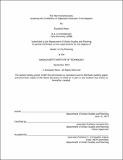The neo-humanitarians : assessing the credibility of organized volunteer crisis mappers
Author(s)
Resor, Elizabeth (Elizabeth Lansdowne)
DownloadFull printable version (1.210Mb)
Alternative title
Assessing the credibility of organized volunteer crisis mappers
Other Contributors
Massachusetts Institute of Technology. Department of Urban Studies and Planning.
Advisor
Annette Kim.
Terms of use
Metadata
Show full item recordAbstract
In the past decade humanitarian crises have been occurring with increasing frequency. As of 2013 the United Nations Office for the Coordination of Humanitarian Affairs (UN OCHA) is involved in 27 countries, monitoring the response to natural disasters or violent conflict (Where we work n.d.). Over the same period the internet has seen a deluge of new, interactive website and tools. Social media sites that allow users to share their own content with a digital community have led to an explosion of user-generated content online. Meanwhile, internet-based mapping tools, such as Google Maps, make it easy for almost anyone to make maps online. These developments converge in the form of a recent trend: volunteer crisis mapping. Since 2008 individuals have started making maps and collecting spatial data related to humanitarian crises -both violent conflicts and natural disasters. While the role of social media and web-mapping in humanitarian responses has been praised for creating a participatory space in humanitarian responses, the people volunteering to do the crisis mapping remain largely unexplored. Drawing from the neogeography literature which explores the impact amateur mappers in general, this paper seeks to define who the volunteer crisis mappers are, and how they are forming institutional connections to the 'formal' humanitarian sector.
Description
Thesis (M.C.P.)--Massachusetts Institute of Technology, Department of Urban Studies and Planning, 2013. This electronic version was submitted by the student author. The certified thesis is available in the Institute Archives and Special Collections. Cataloged from student-submitted PDF version of thesis. "September 2013." Includes bibliographical references (pages 36-38).
Date issued
2013Department
Massachusetts Institute of Technology. Department of Urban Studies and PlanningPublisher
Massachusetts Institute of Technology
Keywords
Urban Studies and Planning.